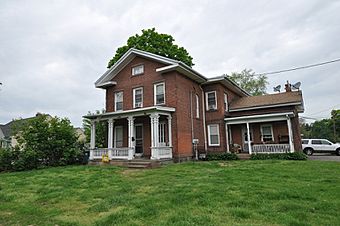Alphonso Johnson House facts for kids
Quick facts for kids |
|
|
Alphonso Johnson House
|
|
 |
|
| Location | 1 Gilbert Ave., Hamden, Connecticut |
|---|---|
| Area | less than one acre |
| Built | 1859 |
| Architectural style | Greek Revival, Italianate |
| NRHP reference No. | 91001922 |
| Added to NRHP | January 17, 1992 |
The Alphonso Johnson House is a special old house in Hamden, Connecticut. It was built in 1859. This house is one of the few brick homes from the 1800s in Hamden. It shows a cool mix of two building styles: Greek Revival and Italianate. Because it's so unique, it was added to the National Register of Historic Places in 1992. This means it's an important historical building.
What the House Looks Like
The Alphonso Johnson House is in a neighborhood in southern Hamden. It sits at the corner of Gilbert and Circular Avenues. This house is two and a half stories tall. It is built with strong brick walls and has a sloped roof.
The house has an "L" shape. There's a smaller brick part on the right side. A garage built in the 1900s is at the back. The bricks are laid in a simple pattern. The roof is not very steep, which was common for Greek Revival style homes.
The front of the house has three sections. The main door is in the middle. Tall, thin windows are on either side of the door. A porch goes across the front. It has square posts and a railing with fancy turned pieces.
Most windows are rectangular. But there's one special round window on the east side. This window lets light into the staircase. Inside, many parts of the house have been updated. However, some of the original old details are still in two rooms downstairs.
History of the House
Alphonso Johnson built this house around 1859. He grew up in a house right across the street, which is no longer there. The bricks for this house were probably made by Johnson himself. He owned a brickyard nearby on Wilmot Brook.
This house is one of only a few brick homes from the 1800s left in Hamden. It mixes the classic Greek Revival style with newer Italianate features. Some parts of the house remind people of the famous architect Henry Austin from New Haven.
Images for kids




